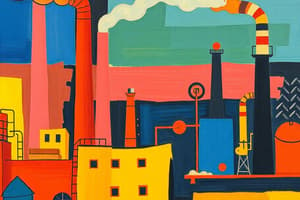Podcast
Questions and Answers
What is the primary goal of a revolution?
What is the primary goal of a revolution?
- To forcibly overthrow a government or social order. (correct)
- To ensure economic stability at all costs.
- To maintain the existing government structure.
- To initiate a peaceful dialogue between opposing groups.
What differentiates economic revolutions from political revolutions?
What differentiates economic revolutions from political revolutions?
- Economic revolutions occur without any violence.
- Political revolutions focus primarily on social changes.
- Political revolutions lead to immediate government changes.
- Economic revolutions involve changes in production methods. (correct)
Which revolution is known for having a significant duration of ten years?
Which revolution is known for having a significant duration of ten years?
- The English Revolution
- The French Revolution (correct)
- The American Revolution
- The Industrial Revolution
What is a common characteristic of political revolutions?
What is a common characteristic of political revolutions?
How do revolutions affect the existing political, economic, and social structures?
How do revolutions affect the existing political, economic, and social structures?
Flashcards
Revolution
Revolution
A forcible overthrow of a government or social order for a new system.
Political Revolution
Political Revolution
A rebellion against an existing government to overthrow it, can be violent or not.
Economic Revolution
Economic Revolution
Dramatic change in a country’s economy through new production methods.
English Revolution
English Revolution
Signup and view all the flashcards
Industrial Revolution
Industrial Revolution
Signup and view all the flashcards
Study Notes
Revolution Definition
- A forcible overthrow of a government or social order, replacing it with a new system
- Synonyms include rebellion, revolt, insurrection, mutiny, uprising, riot, rioting, rising, insurgence, insurgency, coup, overthrow, seizure of power, regime change
Revolution Characteristics
- Dramatic change in politics, economics, or society
- Often involves a group rebelling against the government and attempting to overthrow it
- Can be violent, like the French Revolution, or bloodless
- Economic revolutions involve major changes to the economy, such as new production methods
- Example is the invention of new production methods rapidly speeding up manufacturing and expanding production
Examples of Revolutions
- The English Revolution, leading to constitutional monarchy in England
- The Industrial Revolution which changed European economies gradually
- The French Revolution which took 10 years and involved significant struggle, resulting in periods of despotism before achieving democracy.
Studying That Suits You
Use AI to generate personalized quizzes and flashcards to suit your learning preferences.




